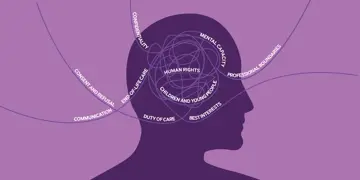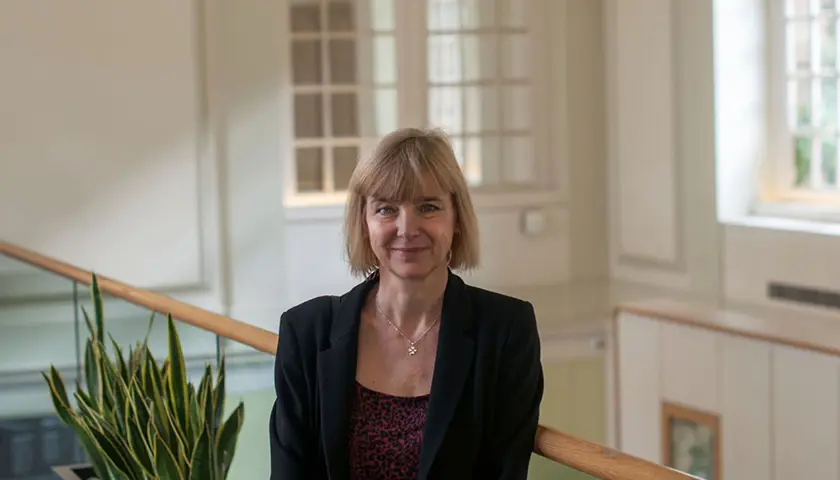
The right call: ethical decisions
The BMA medical ethics and human rights department is respected as a source of guidance for doctors but is less well known for its work in preventing damaging new laws and rulings from coming to pass.
It’s a medical truism that prevention is better than a cure – and this can also be the case when it comes to policy or legislation. Yet although there are clear benefits in preventing bad laws being enacted, or harmful policy being implemented, it’s often much less visible than putting a stop to something when it has already gone disastrously wrong.
This is a challenge faced by the BMA ethics department and medical ethics committee. Although well-known and respected for its headline work on high-profile ethical issues, such as assisted dying, it’s less recognised for the work it does behind the scenes to – to put it crudely – stop bad things from happening in the first place.
Recent examples include intervening in a Supreme Court case to ensure that doctors don’t have to bombard patients with irrelevant information on possible courses of alternative treatment they do not deem reasonable – so you don’t have to raise the pros and cons of homeopathy for a broken hip, for example.
And GPs can also be thankful the police in England and Wales don’t have the right to access confidential health information for blanket and routine purposes, putting confidentiality and the doctor-patient relationship in serious jeopardy.
The BMA was able to help the Supreme Court understand what doctors actually do.
Veronica English
For Dr Jan Wise, chair of the BMA medical ethics committee, the work the BMA does behind the scenes to mitigate the risks of potentially harmful policy and legislation is vitally important, even if it is often under the radar.
‘One of the things I’m fond of saying is that good organisation work is a bit like effective marital therapy – you never know the arguments you didn’t have,’ says Dr Wise. ‘So the real value of what the medical ethics committee does isn’t just producing the policy papers on how to do things; it’s the discussions with people developing policies or legislation to point out the risks if they go down that line. It heads off the disasters.’
Intervention pays off
Dr Wise, a psychiatrist, has chaired the BMA medical ethics committee for just a year, but has been a member of it for more than two decades and has also chaired the BMA medico-legal committee. He points to the recent McCulloch case where the BMA’s intervention helped prevent a situation where doctors would have to explain the benefits and risks of every possible alternative treatment to patients, even if these options were not considered ‘reasonable’ in their professional opinion.
‘The BMA was able to help the [Supreme] Court understand what doctors actually do, and why this wouldn’t be a good decision.’
He believes the work of the ethics committee is important for BMA members because of its professional work – including reports on ethical issues such as organ donation – and because of the practical effect it has on doctors’ day-to-day working lives.
‘The professional work we do buys us our influence [in the Houses of Parliament],’ he says. ‘Do not underestimate soft power. We are honest brokers and that gets you listened to. We are able to have sensible discussions [with those preparing legislation] to help them understand what may or may not happen, and an informed politician at least doubles the chances of good legislation.’
The work of the BMA ethics department can also help doctors to make ethical decisions in everyday practice. ‘It’s easy to know when you’re making a good decision and a bad decision. The difficulty is with the shades of grey – of differentiating between bad, worse and worst. We all want to make the right decision but there are conflicts, such as resourcing, time, or something else, and sometimes it’s about making the least-worst choice. We’re able to help people see that yes, you’re working under terrible constraints, and we understand why you want to do this, but let’s just help you think about this a little bit.’
Veronica English, BMA head of medical ethics and human rights, says the BMA’s core ethics guidance (an updated version will be published online shortly) is based on the very practical questions doctors raise with the organisation.
But although this – and other guidance tools and reports – are often seen as the public ‘face’ of the ethics department, a great deal more goes on behind the scenes. This includes monitoring possible changes to the law, either in terms of new or amended legislation going through Parliament (including the Scottish Parliament, Welsh Senedd, and Northern Ireland Assembly when it is sitting), but also in cases that reach the various courts across the UK.
‘Case law can have a significant impact on our members and on the requirements on them in the same way that legislation can, but doctors are often much more familiar with legislation because as it’s going through Parliament, there’s usually much more discussion and media coverage and so on. So, part of our role is to monitor developments in case law by looking at the cases that are coming through the courts then picking anything up that might have an impact on clinical practice.’
Legal intervention
Raising awareness of potential changes among doctors, for example, via BMA newsletters, is one response, or BMA guidance might need to be brought in line with new developments. But the organisation can also intervene if it fears a court case might bring detrimental change to the way that doctors practise – such as in the McCulloch case.
‘The McCulloch case is an example of where we can stop things that would have a negative impact from happening,’ she says. This is a real, practical way the BMA is supporting members, but it isn’t well-recognised, she adds.
‘We’re keen for members to be aware of that part of our work, because sometimes people get the feeling ethics is something a bit airy fairy, a bit academic. But the work we do is actually about doctors’ day-to-day practice and trying to act on behalf of our members.’
Another example of the committee’s preventive work was two years ago, when the BMA strongly opposed a clause in the Police, Crime, Sentencing and Courts Bill, which would have ended at a stroke the common law duty of confidentiality protection for some health information.
As originally drafted, the Bill created a legal requirement for CCGs (clinical commissioning groups) and local health boards, to provide information to the police for the purposes of planning to prevent and reduce serious violence in their local areas. This requirement to disclose would have overridden the obligation of confidence doctors and health providers owe to their patients.
Doctors can, of course, provide information on patients without consent on a case-by-case basis if there are compelling reasons to do so ‘in the public interest’ in accordance with guidance from the GMC – but this bill would have made it possible for police to demand patient information routinely from CCGs and local health boards.
Leading an alliance with the GMC and the National Data Guardian – and with the strong support of some peers – the BMA succeeded in persuading the Government to amend the original wording of the bill, ensuring the continuing protection of patient information.
The BMA medical ethics committee is unusual in that, in addition to the medical members, it includes people who aren’t clinical, but who have different expertise – for example, as professors of ethics, or as lawyers. But in addition, the staff are linked in to networks in areas of interest, so that, for example, contacts will bring potential cases of interest to their attention. The department also offers ethics advice to individual doctors via the BMA’s first point of contact service.
‘A lot of enquiries can be dealt with from the guidance on our website, but in more complex cases, doctors come to us for specific advice and, where appropriate, we can talk through the issue with them,’ says Ms English.
I cannot remember anybody coming along who didn’t leave genuinely impressed with the quality of the discussion, the evidence, the decision-making, and what’s produced.
Veronica English
'Part of this can be guiding doctors on how to approach an ethical question and how to balance competing interests when making a decision. If there’s a straightforward legal answer, we will provide that information and refer to the guidance, but in most cases it’s actually helping the doctor to think through the ethical issues to make sure they’ve considered all the relevant factors to help them make what they feel is the right decision, and one they can justify.’
Sometimes members will approach the BMA after being assured by their medical defence organisation they will be supported in whichever decision they take in a particular situation (when there is no obvious ‘right’ answer, for example) but they are still unsure of how best to act. Dilemmas include various scenarios such as whether it’s right to give out patient information to the police, for example.
‘There’s a list of questions [on the website] such as “is it possible to get consent?”; “Why do they need the information?”; “Is it a serious crime?”; “Does it reach the GMC’s criteria for breaching confidentiality?”; “What sort of information is needed?”. It’s helping doctors think through the questions they need to ask themselves when they’re making a decision.’
When visitors attend the BMA medical ethics committee, they are often surprised by what they see. ‘I cannot remember anybody coming along who didn’t leave genuinely impressed with the quality of the discussion, the evidence, the decision-making, and what’s produced,’ Dr Wise says.
‘Part of that is because we attract people who want to sit on the committee who aren’t doctors: they are professors, leaders in their fields, whether it’s moral philosophy, legal practice, sociology or anthropology. That gives us a real plurality of views that stops us being in a silo.’
The BMA’s new ethics guidance will be a vital tool for doctors, he says, and will help them to do their job as well as providing a measure of protection.
‘If you don’t have an ethical compass you’re going to be adrift at sea. To paraphrase Risky Business a little, your job is dealing in human misery, pain and suffering and it is so easy to get lost in that if you don’t know where north is. This guidance will keep you on the correct path – it will see you home in the darkest nights and the worst storms. The ethics secretariat and the members of the committee have done the heavy lifting to make it as safe as possible for you.’
BMA acts to prevent threat to doctor-patient confidentiality
Confidentiality is at the heart of the doctor patient relationship, but it has been threatened numerous times by governments over the decades.
Some of these situations are high profile – for example, in 2018, the UK Government was forced to suspend an arrangement in which the NHS shared patient information with the Home Office so that it could trace people breaking immigration rules. The BMA was among campaigners fighting to overturn the move.
Two years ago, the BMA fought strongly against another attempt to undermine patient confidentiality contained in the Police, Crime and Sentencing Bill. Tucked away among many other provisions there was a clause that, if allowed to go ahead, would have ended at a stroke the common law duty of confidentiality protection for all confidential health information.
Doctors can, of course, provide information on patients on a case by case basis if there are compelling reasons to do so – but this bill would have made it possible for police to demand patient information routinely from clinical commissioning groups and local health boards.
Working with the GMC and the National Data Guardian – and with the strong support of some peers – the BMA succeeded in persuading the Government to amend the original drafting of the bill, ensuring the continuing protection of patient information.
Doctors can, of course, provide information on patients on a case by case basis if there are compelling reasons to do so – but this bill would have made it possible for police to demand patient information routinely from clinical commissioning groups and local health boards.
Working with the GMC and the National Data Guardian – and with the strong support of some peers – the BMA succeeded in persuading the government to amend the original drafting of the bill, ensuring the continuing protection of patient information.
Sophie Brannan, senior ethics adviser with the BMA, and senior public affairs officer Holly Weldin worked together to persuade ministers to amend the bill. ‘I think we were successful because it was a collaborative process,’ says Ms Weldin. ‘We used various different facets like working with stakeholders, contacting government’s bill team (who were drafting the bill), ministerial meetings, and working with peers in the House of Lords.
‘The bill was the government trying to improve the way it deals with serious crime, which obviously we don’t disagree with as an overall objective. We just didn’t approve of the way that they were dealing with health data.’
It can be challenging to spot legislation that might have an impact on ethical issues, explains Ms Brannan. ‘I rely on Holly and her team to scan forthcoming legislation and see if there’s anything that will have an impact from a medical ethics perspective.
‘It’s quite difficult, because often the title of the legislation doesn’t betray the fact that within it, there’s something that is going to impact on medical confidentiality or any other medical ethics issue, so it’s almost an impossible task to look at every single piece of legislation. But we do our best, and we usually manage to catch it at some stage.’
Extensive networks of contacts are vital in helping the BMA to ‘catch’ threats like this, adds Ms Brannan, adding that society as a whole benefits from protecting patient confidentiality. ‘At the heart of this is the relationship of trust between doctors and patients, and medical confidentiality is a fundamental requirement of that. When a patient goes to see their doctor, they must be able to trust that the doctor will keep their information confidential unless there’s a compelling reason not to.
‘If you take that trust away there’s serious detriment not just to the individual patient’s own health, but there’s also detriment to the quality of data for system-wide purposes such as medical research or health service planning. If patients don’t give the full picture, the data isn’t accurate, and system-wide decisions on how health services are run are being made on not great data – that impacts us all.’
How to approach an ethical question – six-step approach
- Recognise that you are facing an ethical question
- Identify the ethically important components
- Where necessary, seek additional information
- Identify any relevant legal or professional guidance
- Critically analyse the question
- Support the decision with sound arguments.
- Until September 2024, resident doctors were referred to as ‘junior doctors’ by the BMA. Articles written prior to this date reflect the terminology then in use




